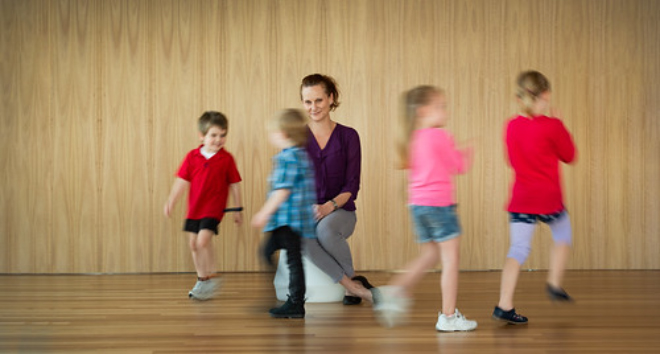Wiggle it a little bit for better school performance

Turns out sitting still doesn’t work as well as wiggling marching and tapping, a beat aids young children to develop their self-regulation skills and improve school readiness.
Associate Professor Kate Williams from QUT designed a preschool program, called RAMSR, focussing exclusively on rhythm and movement activities linked to pathways in the brain to support attentional and emotional development.
“Think heads, shoulders, knees and toes but do the actions backwards while you sing forwards. It tricks the brain into gear,” Williams said.
The Queensland study, involving 113 children from lower socioeconomic communities, measured the effectiveness of the program to boost self-regulation skills.
“Being able to control your own emotions, cognition and behaviours is an important predictor of school readiness and early school achievement,” Williams said.
“The aim is for regular sessions to be introduced into daily activities of young children to help support their attentional and emotional regulation skills, inhibition and working memory.
"We want all early childhood teachers to feel confident to run these fun and important activities.”
The findings have been published in the international peer-reviewed Psychology of Music.
The study is a unique investigation about preschool children and the application of a rhythm and movement program to address socioeconomic-related school readiness and achievement gaps.
Williams said differences in neurological processes can produce educational inequalities for young children who experienced disadvantage.
It’s been identified by UNICEF as an international priority.
The study recognises what Williams describes as the ‘musician advantage’ – enhanced neural plasticity and executive functioning – particularly among children given formal musical instruction.
“The children who have music lessons from a young age are often from families who can afford them,” she said. “The problem is that the children who most need the musician advantage miss out because it isn’t affordable for all families to access highly quality music programs.”
She said the benefits of early shared book reading between parents and children have long been established.
Another recent Australian study, led by Assoc Prof Williams was the first to show that early shared music activities in the home also contribute to positive development.
The preschool program involved group sessions for 30 minutes twice a week across eight weeks, with stages becoming more challenging to stimulate change and development in self-regulation skills.
Assoc Prof Williams is a Senior Research Fellow at QUT as well as a Registered Music Therapist. She is also a recipient of an Australian Research Council Discovery Early Career Researcher Award Grant to further develop and widen the preschool program to more children from 2019-2021.
The program is also being supported by C&K Childcare and Kindergartens.
Listen to Kate Williams on QUT Teacher PodClass: Start the day with a song.